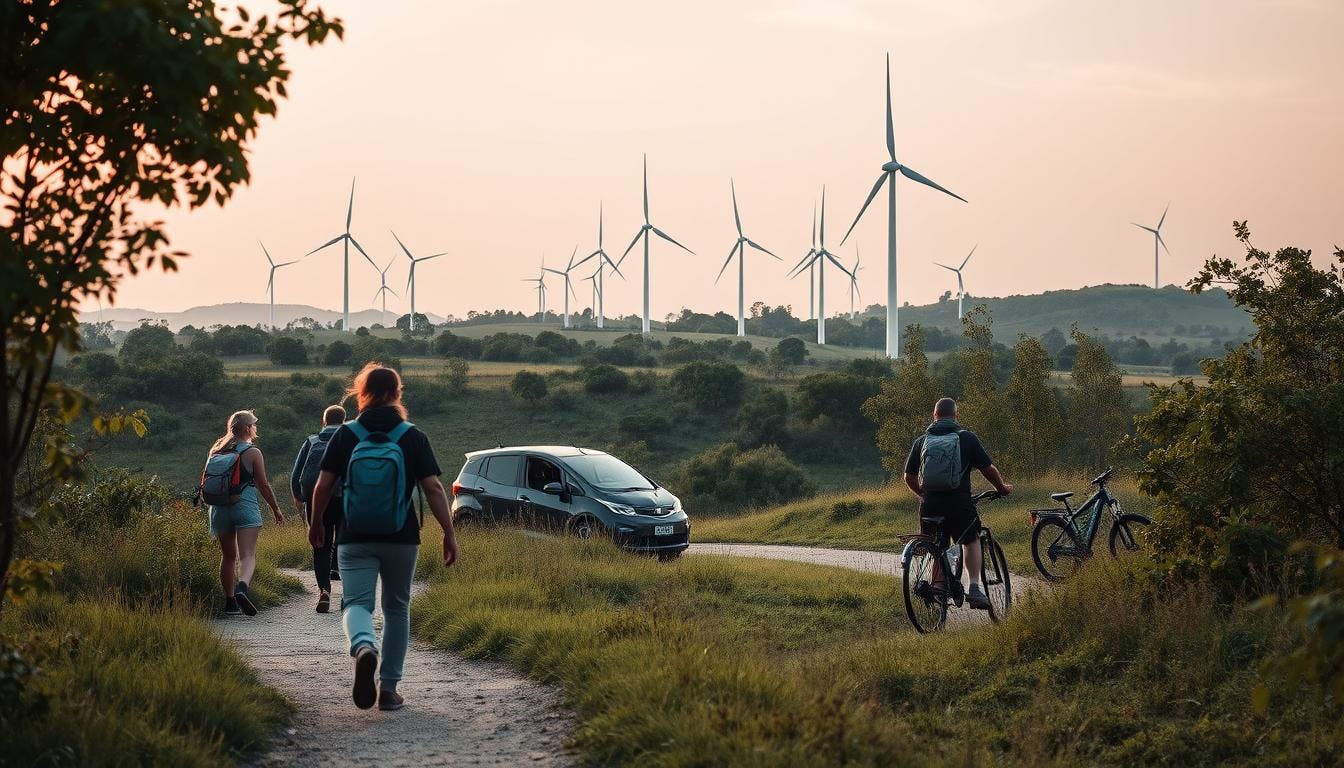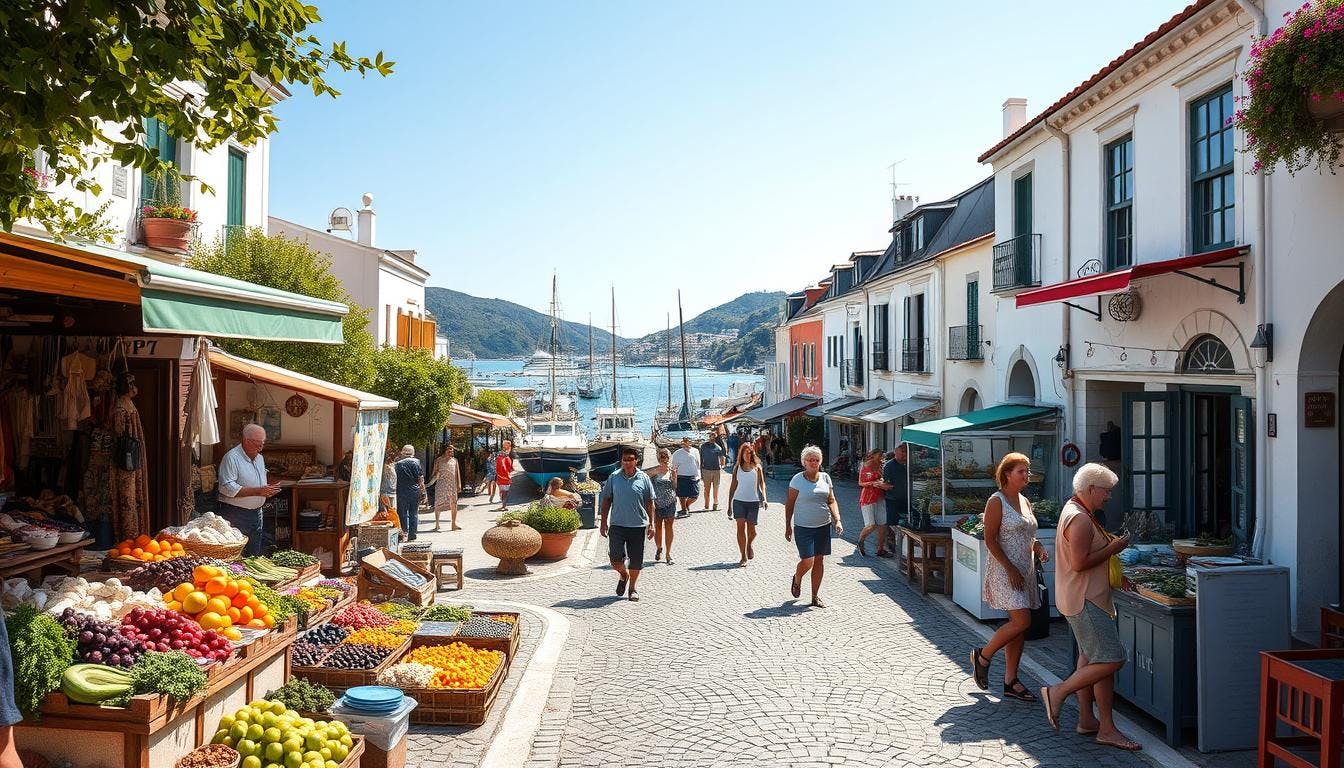Go the extra mile
Towards a cooler planet
Low-impact vacation planning with responsible travel agents
2 April 2025
An increasing number of travellers are now prioritising sustainability, with 83% considering environmentally conscious tourism important, according to a 2024 report. This shift is significant, given that tourism accounts for approximately 8% of global greenhouse gas emissions.
Booking trips in advance not only secures better prices and availability but also aids sustainable travel by alleviating the strain on resources caused by last-minute arrangements. McKinsey's 2024 projections underscore this growing trend.
Responsible travel agents streamline the process by connecting travellers with thoroughly assessed environmentally conscious options, ranging from carbon-neutral tours to sustainable accommodations. Companies such as Intrepid Travel and Natural Habitat Adventures are at the forefront of this movement.
A structured 10-step framework makes sustainable travel attainable, integrating practical logistics with environmental awareness. This approach benefits both travellers and the destinations they visit.

Why sustainable travel is more important than ever
Global tourism's carbon footprint has expanded significantly, now comparable to the emissions of entire nations. Aviation alone contributes approximately 2-3% of global CO₂ emissions, and projections indicate a 25% increase in tourism-related emissions by 2030. Without substantial changes, the industry's impact will intensify climate change and lead to further habitat loss.
The surge in travel following the pandemic adds additional pressure. While forecasts predict a full recovery by 2025, current practices continue to strain ecosystems. Over-tourism results in wildlife habitat destruction, with monitored vertebrate populations experiencing an average decline of 69% since 1970, cultural erosion in overcrowded destinations, and resource depletion in local communities.
Adoption of sustainable aviation fuel (SAF) remains disappointingly low, accounting for just 0.3% of global jet fuel production in 2024. This slow progress underscores the necessity for alternatives such as rail travel or extended stays.
Every journey leaves a lasting environmental impact. Opting for environmentally certified accommodations or travelling during off-peak periods can help reduce this effect. The objective is to harmonise exploration with conservation.

How to master low-impact vacation planning
Transportation choices have a major impact on sustainable travel. The European Environment Agency reports that rail travel emits just 35g of CO₂ per kilometre, compared to 246g for domestic flights. Taking the train instead of flying can cut emissions by 86%.
Airlines differ in their sustainability efforts. United Airlines has invested $1.5 billion in sustainable aviation fuel (SAF) and aims for net-zero emissions by 2050. Delta has pledged $1 billion to cleaner fuel alternatives, while JetBlue’s A220 and A321neo aircraft use 20% less fuel than older models.
Non-stop flights are another way to reduce emissions, using 15–20% less fuel than connecting flights. According to the International Civil Aviation Organization (ICAO), avoiding extra takeoffs and landings lowers overall energy use.
For shorter trips, rail travel is a lower-emission alternative. Amtrak provides the following comparisons for CO₂ emissions per passenger:
- New York to Washington, DC: 3h 30m, 52kg CO₂
- Chicago to St. Louis: 5h 20m, 38kg CO₂
- Los Angeles to San Diego: 2h 55m, 29kg CO₂
For emissions that can’t be avoided, carbon offset programmes offer an option. Verified initiatives, such as Gold Standard and Verra, support projects like reforestation and renewable energy. It’s important to check the transparency of these programmes before purchasing offsets.
Choosing efficient transport and credible offset programmes can significantly reduce travel’s environmental impact.
Choose sustainable vacation hotels
Certifications help travellers identify hotels committed to sustainability. Over 75% of guests prefer accommodations with verified environmental credentials, as these properties reduce waste and support local ecosystems.
Several recognised certification programmes assess hotels’ sustainability efforts:
- LEED (Leadership in Energy and Environmental Design): Rates energy efficiency and sustainable building practices. For example, 1 Hotel South Beach holds a LEED Silver certification for its use of energy-efficient systems and solar panels.
- Green Key: Audits hotels on operational sustainability, including waste reduction and resource conservation.
- EarthCheck: Evaluates a hotel’s impact on local communities and the environment, ensuring adherence to sustainability standards.
Energy consumption varies widely. Large resorts can use around 45 kWh per room, while homestays average just 8 kWh. Smart HVAC systems, such as Nest thermostats, optimise energy use and reduce consumption.
Case studies show sustainable practices make a difference:
- Half Moon Resort offsets 30% of its energy needs using solar panels.
- The Ritz-Carlton Kapalua runs conservation programmes to protect marine life and educate guests.
For travellers looking to book sustainable stays, BookDifferent provides carbon footprint data for hotels, helping users compare environmental impact before booking.
Staying in certified properties reduces the footprint of travel. Many of these hotels use rainwater harvesting, offer locally sourced food, and implement efficient energy systems, making sustainability a core part of the guest experience.


Eat responsibly on vacation
Dining choices significantly affect the environmental impact of travel. According to the United Nations, food loss and waste contribute approximately 8–10% of annual global greenhouse gas emissions, nearly five times the total emissions from the aviation sector. Travellers can help reduce this impact through mindful eating habits.
Comparing the carbon footprints of different meals can inform more sustainable choices. For instance, plant-based meals generally have much smaller carbon footprints compared to animal-based foods. On average, emissions from plant-based foods are 10 to 50 times smaller than those from animal products. Opting for local, seasonal ingredients further decreases emissions associated with transportation and storage.
Some establishments exemplify sustainable dining practices. 1 Hotel South Beach, for example, emphasises menus featuring sustainable seafood and seasonal, organic produce, celebrating regional farmers and fishers. Similar initiatives worldwide support local economies and reduce environmental impact.
When selecting seafood, resources like the Monterey Bay Aquarium’s Seafood Watch provide guidance on sustainable choices. They offer updated recommendations and consumer guides to help identify seafood options that are environmentally responsible. Certifications such as the Marine Stewardship Council (MSC) label also indicate sustainably sourced fish.
The zero-waste dining movement is gaining momentum. For example, some restaurants implement closed-loop systems where waste is minimised, and resources are continually reused. Additionally, apps like Too Good To Go connect consumers with surplus food from local eateries at discounted prices, helping to prevent food waste.
At all-inclusive resorts, being mindful of portion sizes can reduce food waste. Buffet-style dining often leads to excess food disposal; requesting smaller servings or sharing dishes aligns with conservation efforts. By making conscious dining choices, travellers can significantly lessen their environmental footprint while supporting sustainable practices.
Engage in mindful vacation activities
Responsible activities are key to reducing the environmental impact of travel. Ecotourism, as defined by the International Union for Conservation of Nature (IUCN), focuses on conserving ecosystems and supporting local communities. A great example of this is Thailand's move to electric tuk-tuks, which has already cut emissions by 40%.
When engaging in wildlife experiences, always choose ethical options. Look for sanctuaries accredited by the Global Federation of Animal Sanctuaries (GFAS), which ensure animals are rehabilitated rather than exploited. Steer clear of attractions offering elephant rides or tiger selfies, as these can cause harm to the animals involved.
Travel companies like Intrepid Travel follow strict sustainability practices. For example, they adhere to the Roundtable on Sustainable Palm Oil (RSPO) standards to ensure their tours do not contribute to deforestation.
When snorkelling or diving, it’s important to protect coral reefs. Keep at least a 3-metre distance from the reef and avoid touching or standing on it. Practising these simple steps can help preserve these delicate ecosystems.
UNESCO Biosphere Reserves, such as Costa Rica’s Monteverde, have strict visitor limits to ensure their preservation. Monteverde, for example, only allows 120 visitors per day to help protect the area from over-tourism.
Silent hiking is another way to reduce your impact. By keeping noise to a minimum and staying on marked trails, you help protect fragile wildlife habitats.
By choosing responsible travel practices, you can help protect the environment and ensure that destinations remain beautiful and thriving for future generations.


Pack and travel thoughtfully
Smart packing not only reduces waste but also lowers your carbon footprint. According to the Environmental Protection Agency (EPA), 60–80% of marine debris is plastic, much of which comes from travel. Simple changes in what you pack can have a significant impact.
Start by choosing reef-safe sunscreen. Many conventional sunscreens contain oxybenzone, which can harm coral reefs. Instead, opt for sunscreens with non-nano zinc oxide, which are safer for marine life. Brands like Sun Bum and Black Girl Sunscreen offer environmentally-friendly formulas.
Consider packing TSA-compliant solid toiletries, such as shampoo bars from Ethique. These bars help eliminate the need for plastic bottles, reducing plastic waste. The Grayl GeoPress is another great option, providing a way to filter water and cut down on the need for single-use plastic bottles.
Travelling lighter can also make a difference. American Airlines notes that bags weighing 50lbs or more can increase emissions by 2%. Reducing the weight of your luggage helps lower your overall carbon footprint.
Opt for plastic-free essentials like Stasher bags and Bambu utensils, which reduce waste during your trip. Reusable water bottles are also a great choice, allowing you to fill up at airports or hotels rather than buying single-use plastic bottles.
Lastly, multi-purpose clothing saves space and weight. A capsule wardrobe, where every item can be mixed and matched, works for any destination and minimises the amount of luggage you need to carry. These simple steps help strike a balance between convenience and sustainability, allowing you to travel more responsibly.
Shop responsibly for your vacation
Making thoughtful shopping choices can reduce the environmental impact of your trip. The fashion industry is responsible for 10% of global emissions, but there are better options to consider.
Fast fashion uses up vast resources. For instance, producing a single cotton shirt can require 2,700 litres of water. Instead, opt for sustainable brands like Patagonia or rent clothing for your trip. Clothing rentals are becoming increasingly popular, with companies like Rent the Runway seeing 40% annual growth in vacation rentals.
When buying souvenirs, choose products that ensure fair treatment of local artisans. Look for labels like Fair Trade or WFTO, which guarantee fair wages. Authenteco Travel works with local makers to offer sustainable items while supporting conservation.
Upcycling is another way to reduce waste. Patagonia’s Worn Wear programme extends the life of clothing, while Marine Layer’s Re-Spun turns old t-shirts into new fabric.
Remember to pack reusable bags and avoid plastic souvenirs. These simple actions can reduce your carbon footprint and help support local communities in a meaningful way.


Support local communities through tourism
Tourism accounts for 10.4% of global GDP, according to data from the World Travel & Tourism Council (WTTC). This economic power can be harnessed to support local communities when spent in the right way. Opting for locally-focused options ensures that money stays within the community where it can have the greatest impact.
Bali offers a clear example of tourism’s dual impact. While tourism generates 80% of the island's income, all-inclusive resorts typically retain just 20% of that income locally. In contrast, independent shops and homestays circulate 70% more within the community, directly benefiting local residents.
Platforms like ViaHero and Lokal provide direct connections with local guides, cutting out corporate intermediaries. The fees paid by travellers go straight to the guides and their families, ensuring that the money supports the people who provide the service.
Fairbnb.coop operates with a similar ethos. It certifies homestays that directly benefit local neighbourhoods, ensuring 50% of the profits fund community projects. This model helps small businesses grow alongside tourism, creating a sustainable future for both.
EU Blue Badge guides are a prime example of how well-trained, certified professionals can contribute to tourism. Their training ensures cultural knowledge is passed on responsibly, while they also support local resources. Certified guides earn 40% more than their unlicensed counterparts, reflecting their added value to the local economy.
Artisan cooperatives, such as Ghana's Global Mamas, are another example of sustainable commerce. Their handmade goods provide fair wages to artisans, while profits fund environmental education and conservation projects, ensuring that each purchase supports both local communities and the environment.
Travellers can increase their positive impact by making simple choices. Dining at family-run restaurants or booking tours through local cooperatives helps strengthen the local economy and provides lasting benefits to the community beyond the trip.
Your journey towards sustainable travel begins now
Industry collaborations are key to accelerating the shift towards more sustainable travel. The ASTA Sustainability Pledge brings travel agents together to reduce the environmental impact of tourism. According to 2024 data, the adoption of Sustainable Aviation Fuel (SAF) could cut aviation emissions by 80%.
To make informed choices, use verification tools such as EcoCert or the B Corp directory, which highlight reliable, environmentally conscious options. Booking.com’s Sustainable badge also helps identify responsible choices with ease.
Start small with a 30-day action plan:
- Week 1: Choose rail or direct flights.
- Week 2: Switch to reef-safe sunscreen.
- Week 3: Book local guides through services like Lokal.
- Week 4: Offset emissions through certified programs such as Gold Standard.
Every step makes a difference. Conservation begins with mindful travel choices.
17 South Street
Auckland 1010
New Zealand
info@carbonclick.com- -
- X
Sign up. Be inspired. Get clicking.
Subscribe now to stay up to date with CarbonClick, carbon offsetting and climate action.
By signing up you agree to our Privacy Policy.


